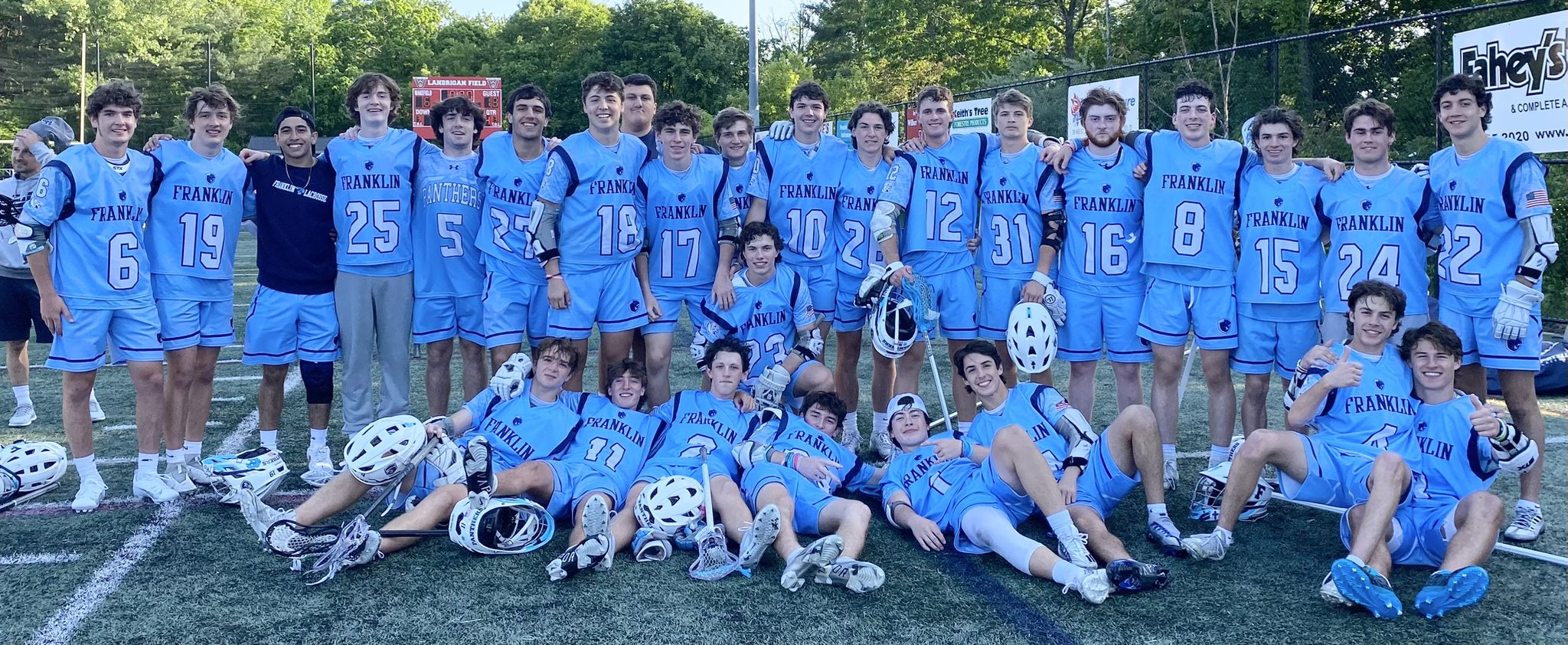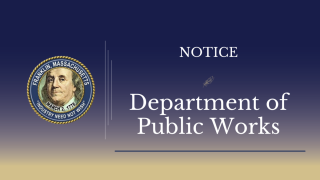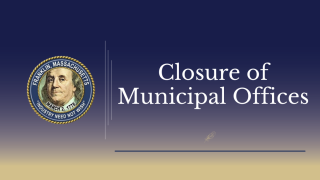Providing accurate and timely information about what matters in Franklin, MA since 2007. * Working in collaboration with Franklin TV and Radio (wfpr.fm) since October 2019 *
Saturday, May 27, 2023
Congressman Auchincloss: An update covering the last 2 weeks
|
"The Cellar" by 67 Degrees Brewing Readies for the Summer at the Wrentham Village Premium Outlets
FHS boys lacrosse top Wakefield on Friday, finish regular season at 17 wins & 1 loss
That’s a wrap… Panthers finish up the regular season with a big win and a record of 17-1. Ain’t done yet boys… #onegoalConsigli: 5G, 2ASacchetti: 2G, 5ADavis: 1G, 5A
 |
| Panthers finish up the regular season with a big win and a record of 17-1. |
T-shirts! T-Shirts! We have Celebrate with Pride T-shirts for sale!!!
|
DPW Reminder - Curbside Trash Pick-up: one day delay for the entire week due to Memorial Day
Thank you.
Shared from -> https://www.franklinma.gov/home/news/dpw-reminder-curbside-trash-pick-one-day-delay-entire-week-due-memorial-day
 |
| DPW Reminder - Curbside Trash Pick-up: one day delay for the entire week due to Memorial Day |
NOAA predicts a near-normal 2023 Atlantic hurricane season
"The Atlantic hurricane season will bring an average number of ocean storms and hurricanes this year, the National Oceanic and Atmospheric Administration (Noaa) said on Thursday.Noaa forecasters estimate 12 to 17 named storms of which five to nine of those will develop into hurricanes and one to four will become major hurricanes during the 1 June to 30 November season.The guidance came as experts considered the possible impacts this year of the El Niño weather system, which can dampen hurricane activity, and increasingly warm ocean temperatures, which can make storms more powerful.“What it boils down to is: which is going to win or do they just cancel each other out and you end up with a near-normal season?” said Colorado State University hurricane researcher Phil Klotzbach. “I respect them both.”
"NOAA forecasters with the Climate Prediction Center, a division of the National Weather Service, predict near-normal hurricane activity in the Atlantic this year. NOAA’s outlook for the 2023 Atlantic hurricane season, which goes from June 1 to November 30, predicts a 40% chance of a near-normal season, a 30% chance of an above-normal season and a 30% chance of a below-normal season.NOAA is forecasting a range of 12 to 17 total named storms (winds of 39 mph or higher). Of those, 5 to 9 could become hurricanes (winds of 74 mph or higher), including 1 to 4 major hurricanes (category 3, 4 or 5; with winds of 111 mph or higher). NOAA has a 70% confidence in these ranges."
https://www.noaa.gov/news-release/2023-atlantic-hurricane-season-outlook
 |
| A summary infographic showing hurricane season probability and numbers of named storms predicted from NOAA's 2023 Atlantic Hurricane Season Outlook. (Image credit: NOAA) |
The Guardian: "PFAS levels in ground and air could be higher than expected, research suggests"
"Background levels of toxic PFAS “forever chemicals” in the ground and air may be much higher than previously thought, federal testing of spatially random soil samples from across New Hampshire suggests.The analysis found high levels of PFAS in all 100 shallow soil samples, which were taken from undisturbed land not close to known polluters. The chemicals are thought to largely have gotten there through the air, and the study, along with recent EU research, suggests similar levels of soil and air contamination throughout the world.The findings are “pretty disturbing” and raise fresh questions about contamination of food and water, said Mindi Messmer, a former New Hampshire state representative who advocates for stronger PFAS bans.“However it got here, it’s there and it is widespread,” she added. “It’s the fault of decades of regulatory inaction.”
 |
| Studies have found rain to contain high PFAS levels. Photograph: Joe Portlock/Formula 1/Formula Motorsport Limited/Getty Images |
Franklin Municipal Building & Library CLOSURE - May 29, 2023 for Memorial Day
Shared from -> https://www.franklinma.gov/home/news/franklin-municipal-building-closure-may-29th-2023 and -> https://www.franklinma.gov/franklin-public-library/bulletins/library-closed-memorial-day
 |
| Franklin Municipal Building CLOSURE - May 29, 2023 for Memorial Day |
 |
| Library closed for Memorial Day |
Friday, May 26, 2023
Franklin's Event Outlook: May 26, 2023 to June 2, 2023
Friday, May 26
8:00am - Love Letter - art display (during open hours) (Franklin Public Library)
9:00am - Memorial Day Breakfast (Franklin Senior Center)
4:30pm - Yarii's Kitchen (food truck) (67 Degrees Brewery)
6:00pm - Carolyn Rae & the Rumors (live music) (67 Degrees Brewery)
6:00pm - AK Cody (live music) (La Cantina Winery)
Saturday, May 27
8:00am - Love Letter - art display (during open hours) (Franklin Public Library)
10:00am - Franklin Historical Museum (always free)
11:00am - Yoga in the Taproom (67 Degrees Brewery)
2:00pm - Pups & Pints @ The Cellar (67 Degrees Brewery - Wrentham Village Mall))
4:00pm - The Fourtet (live music) (La Cantina Winery)
Sunday, May 28
8:00am - Love Letter - art display (during open hours) (Franklin Public Library)
1:00pm - Franklin Historical Museum (always free)
Monday, May 29 - Memorial Day
10:30am - Memorial Day Parade (starts at Dean College, ends at Town Common)
12:00pm - Memorial Day Ceremony (on war memorial side of Town Common)
Tuesday, May 30
8:00am - Love Letter - art display
7:00pm - Cinema Zeotrope: "If Beale Street Could Talk" (donation suggested) (THE BLACK BOX)
Wednesday, May 31
8:00am - Love Letter - art display
1:00pm - Senior Scribblers (writing group)
Thursday, June 1
First Day of LGBTQ+ Pride Month
8:00am - Love Letter - art display
6:30pm - Franklin LGBTQ Alliance - monthly meeting
-----------------
If you have an event to add to the calendar, you can use the form to submit it for publication: https://forms.gle/oPdi8X3ZbHHyrHzo6
The School district calendar is found https://www.franklinps.net/calendar-by-event-type/26
MA Senate Overwhelmingly Approves Fiscal Year 2024 Budget
- $125 million for Higher Education Capital Funding, focused on reducing backlog of deferred maintenance projects
- $100 million for Financial Aid Expansion to expand financial aid programs for in-state students attending state universities through MASSGrant Plus, bringing the total proposal for this program to $275 million, more than doubling the amount of scholarship funding provided by the state just two fiscal years prior
- $100 million for Massachusetts School Building Authority Capital Supports for cities, towns and school districts experiencing extraordinary school project costs impacted by post-COVID inflationary pressures
- $30 million for Student Support Services to ensure students in the Commonwealth have success on the post-secondary level through wraparound supports, bringing the total program investment to $44 million
- $25 million to reduce the waiting list for the income-eligible child care assistance program, which will create approximately 2,200 new slots for children
- $25 million for capital investments in early education and care programs to build capacity and ensure the ability of programs to safely accommodate additional slots
- $20 million for Mass Reconnect, as a first step toward free community college in the Commonwealth for those aged 25 and older
- $20 million for a Free Community College Program for nursing students as a pilot to support a high-need workforce area and build toward universal free community college in the fall of 2024
- $15 million for Free Community College Implementation Supports to collect necessary data, develop best practices, and build capacity for free community college in the fall of 2024
- $15 million for the Commonwealth Preschool Partnership Initiative, which empowers school districts to expand prekindergarten and preschool opportunities through public-private partnerships; this funding is on top of an additional $15 million in non-Fair Share funding for this initiative
- $15 million to expand upon the Senate-championed program that supports early education and care staff members with paying for their own personal child care
- $10 million for Early College and Innovation Pathways
- $190 million for MBTA Capital Investments for critical capital resources for both the subway and commuter rail systems
- $100 million for Regional Transit Funding and Grants, which will exclusively be used to support the work of the Regional Transit Authorities that serve the Commonwealth, more than doubling the total funding for RTAs to $194 million, including:
- $56 million to be distributed to RTAs for operating assistance, with special attention paid to those RTAs with historically low state operating assistance
- $25 million for an innovation grant program for transportation providers across the Commonwealth for initiatives such as electrification, infrastructure, capital investments, new and innovative service delivery models, expanded service hours or weekend service, rural connectivity, and connectivity improvements across regional transit authority service areas
- $15 million for fare-free pilot program grants to provide six months of fare-free RTA service across the Commonwealth
- $4 million through the Community Transit Grant Program to support expanded mobility options for older adults, people with disabilities and low-income individuals
- $100 million in supplemental aid for roads and bridges, half of which will be expended consistent with the Chapter 90 program, while the other half will be spent with a focus on the total mileage of participating municipalities
- $50 million for a reserve to provide matching funds for transportation projects that are eligible for federal funds, which will help the state better compete for increased federal transportation funding made available by the Biden Administration
- $50 million for Highway Bridge Preservation, to ensure that consistent funds are provided to make sure that critical infrastructure does not fall into disrepair
- $5 million for MBTA Means-Tested Fares, which will cover initial exploration of the feasibility of implementing a means-tested fare program at the MBTA
- $5 million for Water Transportation, which will cover one-time expenses for a pilot program covering operational assistance for ferry services
- $45 million for the center-based childcare rate reserve for reimbursement rates for subsidized care, including:
- $20 million in line-item appropriations, and
- $25 million in expected leftover funds from Fiscal Year 2023
- $30 million for the Commonwealth Preschool Partnership Initiative, which empowers school districts to expand prekindergarten and preschool opportunities through public-private partnerships. This is double the amount that was appropriated for this initiative in FY23.
- $25 million in new funding to reduce the waiting list for income-eligible child care assistance program, which will create approximately 2,200 new slots for children
- $25 million in new funding for capital investments in early education and care programs to build capacity and ensure the ability of programs to safely accommodate additional slots
- $17.5 million for grants to Head Start programs, which provide crucial early education and child care services to low-income families
- $15 million, an increase of $5 million over FY23, to assist early education and care staff members with paying for their own personal child care
- $10 million for professional development and higher education opportunities for early educators, to assist with recruitment and retention challenges in the workforce
- $5 million, an increase of $1.5 million over FY23, for mental health consultation services in early education and care programs
- In addition to these appropriations, the Fiscal Year 2024 budget includes a policy section that will allow subsidized early education and care programs to provide child care discounts to their own staff members.
- $503.8 million for the special education circuit breaker
- $230.3 million for charter school reimbursements
- $97.1 million to reimburse school districts for regional school transportation costs, representing a 90% reimbursement rate
- $15 million for Rural School Aid supports
- $15 million for Early College programs and $12.6 million for the state’s Dual Enrollment initiative, both of which provide high school students with increased opportunities for post-graduate success
- $5 million to support implementation of the Massachusetts Inclusive Concurrent Higher Education law, including:
- $3 million for grants offered through the Massachusetts Inclusive Concurrent Enrollment initiative to help high school students with intellectual disabilities ages 18–22 access higher education opportunities, and
- $2 million for the Massachusetts Inclusive Concurrent Enrollment Trust Fund
- $2.5 million for the Civics Education Trust Fund, after an increase of $1 million through the amendment process, to promote civics education and civic engagement throughout the Commonwealth.
- $2 million for the Genocide Education Trust Fund, continuing our commitment to educate middle and high school students on the history of genocide.
- $1 million, adopted through the amendment process, for the Department of Higher Education to support Hunger-Free Campuses for both two- and four-year public institutions of higher education and minority serving institutions
- $2.9 billion for a range of services and focused supports for people with intellectual and developmental disabilities
- $597.7 million for Department of Mental Health adult support services, including assisted outpatient programming and comprehensive care coordination among health care providers.
- $582 million for nursing facility Medicaid rates, including:
- $112 million in additional base rate payments to maintain competitive wages in the Commonwealth’s nursing facility workforce
- $213.3 million for a complete range of substance use disorder treatment and intervention services to support these individuals and their families
- $119.8 million for children’s mental health services, after an increase of $500K through the amendment process for the establishment of Behavioral Health Pilot Program for K-12 Schools
- $71.2 million for domestic violence prevention services
- $42.9 million for Early Intervention services, ensuring supports remain accessible and available to infants and young toddlers with developmental delays and disabilities
- $33.8 million for Family Resource Centers to grow and improve the mental health resources and programming available to families
- $26.3 million for grants to local Councils on Aging to increase assistance per elder to $14 from $12 in FY 2023
- $25 million for emergency department diversion initiatives for children, adolescents, and adults
- $21.5 million for family and adolescent health, including:
- $9.2 million for comprehensive family planning services, and
- $6.7 million to enhance federal Title X family planning funding
- $20 million to recapitalize the Behavioral Health, Access, Outreach and Support Trust Fund to support targeted behavioral health initiatives
- $19.2 million to support student behavioral health services at the University of Massachusetts, state universities, community colleges, K-12 schools and early education centers
- $15 million for grants to support local and regional boards of health, continuing our efforts to build upon the successful State Action for Public Health Excellence (SAPHE) Program
- $12.8 million for Elder Nutrition Meals on Wheels, after an increase of $1 million through the amendment process
- $6 million for Social Emotional Learning Grants to help K-12 schools bolster social emotional learning supports for students, including $1 million to provide mental health screenings for K-12 students
- $5 million for Children Advocacy Centers to improve the critical supports available to children that have been neglected or sexually abused
- $4.6 million for the Office of the Child Advocate
- $3.8 million for the Massachusetts Center on Child Wellbeing & Trauma
- $2 million for grants for improvements in reproductive health access, infrastructure, and safety
- $1 million, adopted through the amendment process, for the Public University Health Center Sexual and Reproductive Health Preparation Fund for the purpose of reimbursements to public universities for abortion medications
- $1 million, adopted through the amendment process, for the development, expansion and operation of freestanding birth centers and support for community-based maternal health services
- $444.7 million for Transitional Assistance to Families with Dependent Children (TAFDC) and $201.4 million for Emergency Aid to Elderly, Disabled and Children (EAEDC) to provide the necessary support as caseloads increase and to continue the Deep Poverty increases
- $60 million for adult basic education services to improve access to skills necessary to join the workforce
- $36 million for the Massachusetts Emergency Food Assistance Program, after an increase of $1 million through the amendment process
- $20 million for the Workforce Competitiveness Trust Fund to connect unemployed and under-employed workers with higher paying jobs
- $21 million in Healthy Incentives Programs to maintain access to healthy food options for households in need
- $15 million for a Community Empowerment and Reinvestment Grant Program to provide economic support to communities disproportionately impacted by the criminal justice system
- $15.4 million for Career Technical Institutes to increase our skilled worker population and provide residents access to career technical training opportunities
- $5.8 million for the Innovation Pathways program to continue to connect students to trainings and post-secondary opportunities in the industry sector with a focus on STEM fields
- $5 million for community foundations to provide emergency economic relief to historically underserved populations
- $5 million for the Secure Jobs Connect Program, providing job placement resources and assistance for homeless individuals
- $2.5 million for the Massachusetts Cybersecurity Innovation Fund, including $1.5 million to further partnerships with community colleges and state universities to provide cybersecurity workforce training to students and cybersecurity services to municipalities, non-profits, and small businesses
- $600,000 through the amendment process for the Massachusetts Downtown Initiative, which will provide municipalities with technical assistance to promote compact, walkable downtowns that have a vibrant mix of commercial and residential uses, cultural and recreational amenities, and access to public transportation.
- $110.8 million for assistance for homeless individuals
- $107 million for assistance to local housing authorities
- $39.6 million for the HomeBASE diversion and rapid re-housing programs, bolstering assistance under this program to two years with a per household maximum benefit of $20,000
- $26 million for the Alternative Housing Voucher Program (AHVP), including $9.1 million in funds carried forward from FY 2023. This funding increase will create 250 new vouchers and will pair with $2.5 million for grants to improve or create accessible housing units. Both programs will also benefit from the inclusion of project-based vouchers in AHVP, which will stimulate the building of new deeply affordable and accessible homes
- $7.6 million for sponsor-based supportive permanent housing
- $6.4 million for the Home and Healthy for Good re-housing and supportive services program, including:
- $250,000 for homeless LGBTQ youth
- $500,000 through the amendment process for a matched savings, coaching, and support program for first-generation, first-time homebuyers across the Commonwealth
- $194 million for Regional Transit Authorities (RTAs) to support regional public transportation systems, including $100 million from Fair Share funds to support our RTAs that help to connect all regions of our Commonwealth.
- $47.3 million for libraries, including $16.7 million for regional library local aid, after an increase of $750,000 through the amendment process, $17.6 million for municipal libraries and $6.2 million for technology and automated resource networks.
- $25 million for the Massachusetts Cultural Council to support local arts, culture and creative economy initiatives.












